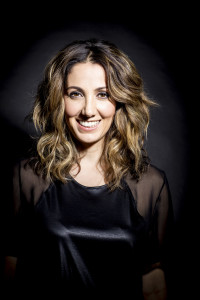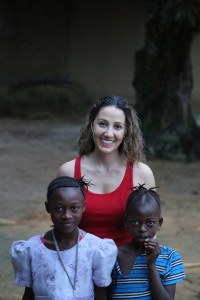Pardis Sabeti: Rock Star Geneticist
As an evolutionary geneticist, Pardis Sabeti uses genetics as a lens by which to investigate the evolution, history, and biology of humans and other species. She is a computational geneticist, meaning she uses statistics and computers to examine data from the genomes of different organisms looking for meaningful patterns. Pardis Sabeti recently shared some of her life experiences with us, including her road to recovery from a tragic accident in the summer of 2015.
What does an evolutionary geneticist do?
There are thousands to millions to billions of letters that make up different organism’ genomes, and these genomes are essentially the instruction book encoding all of our different properties. They are passed down from parents to their offspring generation after generation, with tiny changes that can occur with each passage, and genomes of individuals living today can be used to trace historical relationships back in time. We can develop statistical tools to identify important biological components of genomes, to identify particular genetic changes that have been critical for our survival, or to understand the historical relationships between different populations and different species.
You are one of the leading scientists studying the Zika virus. You are also an advocate for open-sourcing science. Tell us more about that and why it’s important?
The concerning thing about Zika, and many viruses, is how very little we know about them. We still do not have accessible diagnostic tests for Zika and many other viruses in most of the world, or even in many U.S states. We still do not know the extent of Zika’s genetic diversity and how it might relate to the rising prevalence of microcephaly, or impact diagnostic, therapy, and vaccine development. While we should be combining forces to take on these global threats, people instead too often work in silos and fail to share samples and information due to political reasons or perverse incentives. This has been the case for the Zika response, and it has hindered progress amidst a global epidemic. We can no longer afford business as usual. With so much on the line and with the entire world descending on Brazil this summer, there is not a moment to lose.
This past July you were involved in a tragic accident that left you powerless for many months as you recovered. What happened and how did you find the strength to heal and miraculously return to work?
On July 17th 2015, I was in a near fatal crash while at a conference in Montana. I was a passenger on a vehicle that clipped a curb and went over a cliff, careening what could have been hundreds of feet into a ravine. The driver quickly shifted the vehicle to a set of trees catapulting me onto boulders. I shattered my pelvis and knees and had a severe hit to my head, and was found cradling the rock like a rag doll to stop from falling further down. I was airlifted to a hospital in Montana, stabilized and evacuated to Harborview Hospital in Seattle, where I underwent four major surgeries over the following week. I spent the next four months on the West Coast waiting to begin weight bearing again, and then began the long and likely lifetime journey of rehabilitation.
I'm not sure if I have found that strength you are referring to or have done anything miraculous, but thank you. I have not yet processed all I have experienced, but here are three things that helped me through:
1. I needed to be honest about my situation. I didn’t want to speak in euphemisms like "what doesn't kill you makes you stronger". It is not true, and my guess is that it is statistically more likely to make you addicted to painkillers. I instead delved deeply into the struggle of every day and became a student of pain and rehabilitation. I lived the ‘Admiral Stockdale Paradox’, I never lost faith that in the end I would prevail, while still being able to confront the most devastating facts of my current existence.
2. I focused fully on healing and sought help to do so. I had the good fortune of working with Bob Cooley for many years prior to the accident in Boston. Bob is a genius and an accident victim himself, and I followed his every instruction on how to make it through from the outset. I worked with him and his team and an extraordinary number of clinicians, therapists, trainers, body and mind healers of all kinds.
3. I sang. Due to a head injury I could not do any work for many months after my accident, but I slowly began to sing to heal and to write music. It gave me an opportunity to give voice to my thoughts of all kinds, from the uplifting and aspirational to the deeply painful. Bit by bit I have been composting this terrible thing that happened to something – though perhaps not better than before – different.
What advice do you have for young scientists who want to enter your field of work? What kind of discipline does it require to do what you do?
For me, science is such an amazing joy. I love the community that I am part of, the many unanswered questions to pursue, and the thrill of the quest. I knew it was where I belong because I love it whatever the outcome of the work. That is important in choosing a field of work, that it is something you like on the good days and the bad days and with failure. In science failure is part of the job. From experiments failing, to papers and grants being getting rejected, to leads turning cold. Your career can be made by those very rare successes you stumble upon if you can keep the patience, resilience, and perspective to keep on in between.
And whatever field you do pursue, be sure to surround yourself with people who make you smile and laugh and who look out for you. My lab works on some of the world’s deadliest viruses and so the job can be challenging. There are days when we are up against so much that all I have left to say is “It is what it is, we will keep on keeping on.” And we do always keep on keeping on because we laugh together through all of the insanity, and we bond together through every fire we find ourselves enveloped in. It is a beautiful thing to have that kind of love, respect, and loyalty for and from the people with whom you work and live.
As an extension of your creativity, artistic expression and humanitarian work you released a new song this Spring. Tell us more about “Around The World?"
Last year, before my accident, I attended the TIME 100 Gala for my work on Ebola along with Obiageli (Oby) Ezekwesili who spearheaded the “Bring Back Our Girls” movement. That night Oby gave a powerful speech in solidarity with the 219 Chibok girls kidnapped from their school in Nigeria. I was so inspired by her words, that my band mate Bob Katsiaficas and I wrote a song based on and including audio of her speech. In it, I start by saying ‘around the world, they are taking all our little girls, and if we let them fall, one day they will take us all’. But through Oby’s speech and as the song continues, it becomes a message of empowerment, about taking back our little girls, because ‘they are growing strong, and one day they could have it all, if we stand by their side, and don’t let their dreams die’. For the the two-year anniversary of the Chibok girls' kidnapping we created a video for ‘Around the World’ to speak to the need to stand up for them and for the many girls taken all around the world.
The song has also been healing for me. My accident made my experience true vulnerability and the loss of one’s voice and agency. It also made me acutely aware of the short time we all have on this earth. In my time left, I will continue to fight for the vulnerable and the voiceless, working towards the day that their voices can be heard.
Related Links:
The Sabeti Lab, headed by Pardis Sabeti, is part of the FAS Center for Systems Biology at Harvard University, and maintains close ties to the Broad Institute of Harvard and MIT.
Announcing Finalists of 2016 Blavatnik National Awards for Young Scientists
This Powerful New Song Reminds the World That the Chibok Girls Are Still Missing
Medical & Musical Journeys: An Interview with One of Time’s Persons of the Year, Pardis Sabeti




